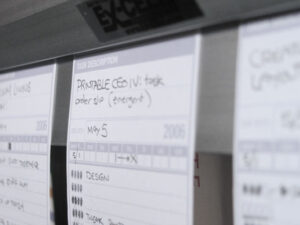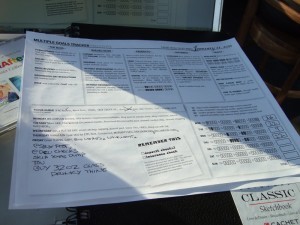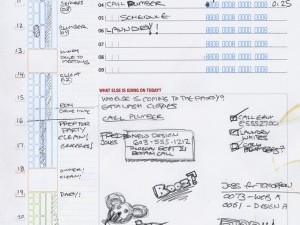(last edited on April 30, 2018 at 10:53 pm)
SUMMARY: I’m coming to an end of a down cycle, and have come to the conclusion that that cleverness alone isn’t enough when it comes to directing actions on behalf of my own future self. In a way, this is a huge relief. This is where I accept that hard work is necessary, but I find myself wondering: I’m not a type A personality, so perhaps it makes sense to ditch type A expectations when it comes to doing the work. The challenge is developing an approach that still yields the kind of benefits I’d like to get out of life.
Let me describe how I’m not a type-A personality. When left to my own devices, I tend to let things flow along under their own momentum. If an opportunity were to present itself, or if I find myself in the position of having to react to an external pressure, then I’ll take action. Otherwise, I’m content to pleasantly drift down on the river of my own thoughts, taking in the scenery and breathing in the honeysuckle air. It’s the life of the river rat, as expressed in Huckleberry Finn and and Wind in the Willows, made possible by the Internet and the blessing of a good personal network.
The aggravating part, of course, is that I’d also like to be drifting in style. Roughing-it on a tiny raft holds less and less appeal as I creep into middle age. When I was a younger traveller, I didn’t mind crashing on the floor of someone’s house overnight. As an older man with developing back problems, I now prefer to stay in nice hotels. I have also developed a taste for Apple Macbook Pros, which cost 3x as much as the performance-equivalent mass-market machine from HP or Dell. Did I mention I like sushi and prime rib? You get the idea.
I suppose what I’m writing about is this universal concern: is my future going to bring riches and comfort? Or will I die like the proverbial Grasshopper in the winter, having played-away the summer of my youth? I’d like to be better-off and not-dead in the near future.
The Limits of Cleverness
Put bluntly, cleverness is a skill that has allowed me to skate-by without having to do as much work. This has been a useful skill to have, but it’s ultimately not a career-builder. Careers are measured in tangible accomplishment of a sustained effort, and cleverness is just one part of it. At best, cleverness is the force-multiplier that enables the impossible. However, like all good tricks, the suspension of impossibility can only occur under very specific circumstances; a great deal of engineering, for example, goes into reliably creating the rare conditions where the trick is even possible.
You might be familiar with the transistor, an electronic device that has made computing possible. The very idea of the Transistor is like the idea of productivity: both are based on leveraging a given input so that you get a larger output. In other words, getting more for less.
It’s instructive to look at the history of the transistor for parallels to productivity. The transistor, as it’s used in computer systems, is based on the clever idea that it can be made to act like an electrically-activated switch. Combined with the idea of boolean algebra, interconnected electrical switches create the basis of digital calculation. Multiply the number of transistors and apply extreme cleverness in creating devices that convert numbers into stuff that people can experience, and you get to where we are today. However, for the transistor to exist in the first place, a lot of time and effort has gone into figuring out how to make them actually work in the real world. The Wikipedia entry gives a great overview of the history, but it does not convey the sheer amount of speculative work that went into developing this device. Today, we can look back at the transistor and confidently call it the Invention of the 20th Century. 50 years ago, transistors were just a sideshow with an uncertain future. Cleverness may have gotten it started, but creating an industry took hard work.
If you translate the importance of the transistor as a transformative device to a human scale, the themes are similar. We want personal productivity to mean amplification of personal potential into actual work. Certain insights have helped us create procedures for being more productive, largely through measurement and process. That’s where most of us, including myself, currently sit. We have this desire—producing more with less effort—and have developed a number of devices (e.g. GTD, to-do lists, project management software) that help us produce it. The yield varies; for disciplined, ambitious people who are naturally system-oriented, productivity soars. For me, the conversion rate seems like it’s less than it should be. I am getting some improvement in my productivity, but it is energy-intensive. I want a LOT more than that. Either there are mistakes in the way I’m doing it, or I’m applying a system that doesn’t work under the conditions that exist.
I don’t know if this is how everyone who yearns to be productive feels, but I want nothing less than the Invention of The Century for Dave Seah. And I want this system to produce a lot more energy for a lot less effort. I can accept that I will be in for a lot of research and development. It’s time to retest my assumptions.
Reversing Assumptions
As I mentioned earlier, I’m coming to the end of a down (as in depressed) cycle. It was not a severe depression, and I didn’t recognize that I was depressed until a few days ago. I knew I was feeling lacking in energy and feeling blah, especially when I was faced with doing “productive” work.
I’ve been here many times, as long-time readers can attest. For the rest of your, the typical cycle is that I have a couple of good insights, identify a few likely problems, and come up with new principles to live by. This works for a few weeks as I test them, and invariably I end up back here wondering why it’s not working. After going through the same cycle multiple times, one has got to wonder if something is amiss.
While I don’t think I’m revisiting the exact same ground every time, it’s happened enough times that I’m forced to review the framework of my assumptions itself:
- Are there some conditions that are innate to my personality that I can not work around?
- If I’m not a type-A personality, does it really make sense to adopt type-A strategies to become more productive?
Here is the list of responsible productivity-producing attributes that I have used in the past. I suspect these are inherently Type A strategies:
- Having the will to set goals, identify deliverables, develop strategies, establish metrics, and follow through consistently.
- Developing good habits.
- Being disciplined.
- Being the leader.
- Being responsible.
- Establishing a clear vision for others to follow.
- Exerting control and enforcing standards.
- Communicating clearly and directly.
If I really think about it, these are abilities I have to switch on, activating whenever I perceive that I will be at a disadvantage through inaction. In other words, they are skills that are triggered by negative associations. Which begs the question: what are my positive triggers?
I suspect that this is where the notions of PASSION, CURIOSITY, PLAY and LOVE become active. Are these the anti-A, positive-B” attributes? What I’m speculatively calling “Type-A strategies are about structure and systems hierarchy. Passion, curiosity, play, and love are something else entirely. In fact, all of my favoritest things are comprised not of discipline, but of goofiness. While I can appreciate a good system and recognize the power of disciplined thinking, this is something I learned to value more professionally than personally. When I am in the mood to get things done, I think in terms of the Type-A Strategies.
What is the alternative?
A set of “Type-B Strategies”, if it exists, would result in benefits that are just as powerful as the professional goal-setting approach. My intuition says that it must exist, because art exists. Furthermore, my experience tells me that outstanding professionalism can not guarantee outstanding creative results. The expression “The Journey is the Reward” is rooted, I think, in the uneasy tension between Type A and Type B strategies, without acknowledging them directly. That’s probably why I’ve never really liked the saying very much; it seems like an admission of defeat spun to look like a silver lining without the spark of actual insight.
(OK, maybe I am being a little bit Type-A here :)
Making an Un-System
There’s a list of insights I’ve been compiling that I think might be the basis of a set of “Type B strategies” (and yes, the paradoxical nature of this term is apparent to me). Here’s a starter list:
- What you pay attention to is what you become expert in.
- What you do every day is what creates the continuity of your world.
- Following your curiosity with all your heart leads to opportunity.
- Seeing what happens is a good way to learn.
- If it doesn’t kill you, it’s worth trying once.
- The way to see the future is to actually go there a few minutes at a time.
- If you think something is awesome, there’s at least 1% of the world that thinks the same way you do. Out of 6 billion people, that means a potential peer group of 60 million people. Out of 1,000 people, that’s 10!
- Sharing what you’re doing changes your world.
There are just three principles that I think are super important in the Type B strategy that yield productive results:
- Pay really close attention to how you’re doing things!
- Share what you’ve discovered with the people around you!
- Strive for the highest-quality experience you can muster!
In this context, the Printable CEO™ work I’ve done is really about making choices; that’s the action part of the Type-B strategy. They’re designed to help you choose to do the following:
- Choosing to pay attention to the most important things, a few at a time, every day, to create the best environment for maintaining attention and continuity.
- Choosing to fix what you’ve discovered in tangible form, to create a high-quality sharing experience,.
The result? Productivity, I think, Dave-style. But I’m not done…this is just the clever part, the insight that might promise the impossible wish of improved productivity for a lot less effort. The hard work is yet to come.






5 Comments
Hi Dave, Thanks for sharing your thoughts ) I’d like to share an idea that’s helping me for last couple of months to be much more productive. I am struggling with online procrastination for some time, and the more time i’m trying to resist going for websurfing every time i feel bored (well, I can’t resist, leechblock helps :), the more i realize that being bored and just doing nothing, is a very nice and refreshing experience. It feels so strange, to just sit there, doing nothing, while there is this whole internetz with so much stuff to read and watch ) And it also feels very unproductive, feels like i’m wasing time. But it’s not wasting time, quiet thinking without distractions is very inspiring ) And the best thing is that being bored while doing nothing is not painful at all ) Worst thing, it can be numb, and maybe just slightly frustrating ) It’s hard to push myself t do nothing, but doable ) I’m trying to say that it’s ok to procrastinate, as long as during procrastinating you just calmly gain inspiration, by doing absolutely nothing. Instead of usual fighting through resistances, and often failing.
I highly recommend reading this regarding game-ification, hard work, procastination, etc. http://www.wired.com/magazine/2011/06/ff_feedbackloop/
I’m currently attempting to start a big project (of my own design and purpose) and finding it difficult to gain momentum to get things started. I’m hoping the principles behind this will help a lot.
Sergey: It sounds like you’ve independently discovered meditation! That’s wonderful! I often find myself clicking mindlessly on the Internet to try to find things that are new and interesting. It’s like eating candy…information that adds no nutritional value to my life, as tasty as it is. I’ve been trying hard to push myself to catch myself here, take a moment, and then push toward something that I can make. It sounds like we’re going through similar insights. Thanks for writing!
Greg: Feedback loops 101! Great article! A lot of what I design is based on these principles…the first Concrete Goals Tracker form, in fact, was designed to create some kind of feedback within the power of one’s own attention span. Feedback is essential. What kind of project are you starting, btw?
Heya Dave, the project revolves around a concept that I’ve come up with that takes the simple concept of a user-definable list to the Nth degree. I’m really just in the very beginning stages, and looking for some coding/development partners.
As someone who is an inveterate Type B, this was absolutely refreshing to read. It really articulates a deep message to me: it is totally unproductive to try to work against your natural grain. Thanks for sharing this.